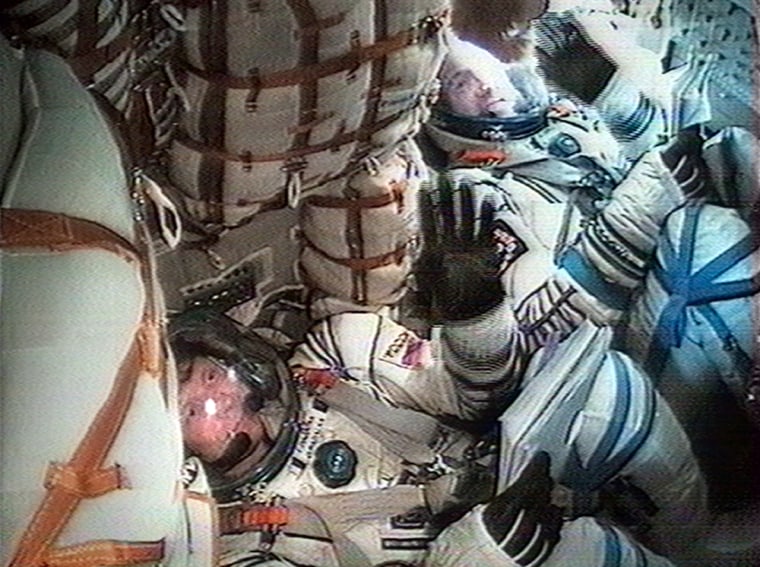A Russian rocket roared into space Monday carrying an American, a Russian and a Dutch man to the international space station on the third manned mission since the halt of the U.S. shuttle program.
American Michael Fincke, Russian Gennady Padalka and Andre Kuipers of the Netherlands, representing the European Space Agency, were to spend two days en route to the ISS aboard the Soyuz TMA-4 spacecraft. The Russian-built capsule is the only means to get to the orbital outpost since the suspension of U.S. space shuttle flights following the February 2003 Columbia disaster.
“Our Russian partners are picking up the ball,” Fincke, 37, said. “It’s very symbolic what we can do when people all over the world work together.”
Just before boarding the spacecraft, the trio paused to wave farewell to relatives, space officials and others who had traveled to the desolate Baikonur cosmodrome, in the steppes of Kazakhstan. Padalka held up two fingers in a victory sign, Fincke gave a thumbs-up and Kuipers brandished a clenched fist.
In orbit
Russian, U.S. and European space officials watched the crew on a monitor from Russian Mission Control outside Moscow. The three astronauts waved and blew kisses from inside the capsule before blasting off. They shook hands after the spacecraft entered orbit approximately nine minutes after the 7:19 a.m. (11:19 p.m. EDT Sunday) lift-off, having shed its boosters along the way.
Applause rippled through Mission Control as the spacecraft reached orbit and its solar panels unfolded.
Padalka and Fincke, who were initially trained to fly on a U.S. shuttle, will spend 183 days on the space station. Kuipers will return after nine days with the station’s current crew, U.S. astronaut Michael Foale and Russian cosmonaut Alexander Kaleri, who have been in orbit since October.
The mission fulfills a lifelong dream for Fincke, a Pittsburgh native who as a child donned cardboard wings and made his siblings play Star Trek.
“He always knew that he would fly,” Fincke’s father Edward said before the launch. “I’m so happy. I want to cry.”
Fincke became the only one of his four brothers to follow their father’s path and join the U.S. Air Force.
Fincke, a lieutenant colonel in the U.S. Air Force and master of aeronautics, astronautics and physical sciences, has logged more than 800 flight hours in more than 30 types of aircraft.
For Kuipers, flying to the international space station is also a dream come true. Kuipers is the Netherlands’ second astronaut, and Dutch journalists at Baikonur call him “our hero.” The first Dutchman flew into space in 1985.
“He has worked very hard to become an astronaut. It was his ultimate dream,” said Kuipers’ wife, Helen Conijn.
His 74 year-old father, Bram Kuipers, said he wasn’t worried about whether his son could cope with the mission or not. But he was overwhelmed at how the Russians treated their guests, feeling they were spoiled with too much food and too much chaperoning: “They tell you where to go and when to eat.” But, he added, “Kuiperses can take a lot.”
Kuipers’s mother Rie and his two daughters Megan, 11, and Robin, 12, also came to Baikonur to watch the launch of the Russian Soyuz TMA-4 spacecraft.
Getting to the space station aboard the three-seater craft is now the only way since the suspension of U.S. space shuttle flights.
NASA-Russian tension
But there are tensions. The Russians want more recognition from NASA for their efforts to keep the space station manned at the expense of its own space programs.
“Russia is taking off its last pair of pants, while the United States and Japan are cutting down their (space) budgets,” said Sergei Gorbunov, the chief spokesman for Russia’s space agency. “This cannot last long.”
Russia had to freeze the construction of its own station segment and some commercial projects, including selling space trips to rich tourists, to mobilize its scarce resources to keep the station afloat while the U.S. shuttle fleet remains grounded.
Space officials now want NASA to agree to prolong crew stints on the space station from the current six months to one year — a move that would allow Russia to make money selling rides to handsomely paying space tourists.
“They will have to agree to our conditions. We are not asking for something impossible,” Gorbunov said.
NASA spokesman Rob Navias said in Baikonur that shuttle flights might be resumed “by this time next year.”
But the two space powers also differ on the station’s prospects.
Under the original agreements between partners in the 16-nation space station project — the United States, Russia, members of the European Space Agency, Japan and Canada — the station was supposed to be manned by six crew members already this year.
However, NASA is aiming at a three-member crew even after resuming shuttle flights.
“Six has been a goal, but whether we get there or not is yet to be seen,” Navias said in Baikonur.
“There is no point having three men there,” said Gorbunov, citing earlier agreements envisaging that three of the six crew members on the station are supposed to be Russians. “We may ask one day: What is an American doing up there?”
Some things, however, don’t change. The crew’s last days before the launch are ruled by longtime Soviet space traditions: On Sunday, the three astronauts were to watch the movie “White Sun of the Desert,” a Soviet-style western set in the Central Asian desert. On Monday morning, before leaving their hotel, they were to take a sip of champagne and sign their names on the doors.
